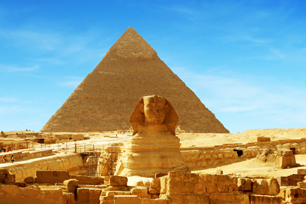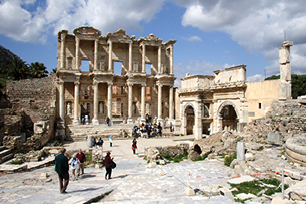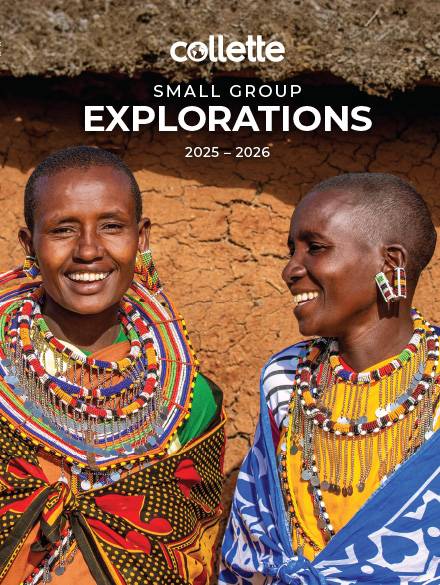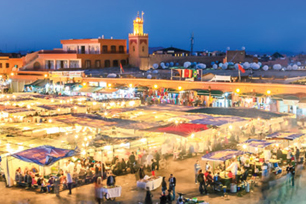The Middle East & North AfricaEgypt | Jordan | Morocco | Türkiye
Request Free Brochure
The Middle East & North AfricaEgypt | Jordan | Morocco | Türkiye
Request Free BrochureFind Your Tour
SMALL GROUP
EXPLORATIONS

Journey Through Egypt and Jordan
SMALL GROUP
EXPLORATIONS

Treasures of Turkiye Istanbul, Ancient Ephesus & Cappadocia
Order Your Brochure Now
The Middle East and North Africa invite a different kind of discovery — one shaped by layered histories, bold landscapes, and everyday life lived in rhythm with tradition. From the windswept ruins of Petra to the maze-like streets of Fez, this is a region that doesn’t just tell stories — it changes the way you see the world.


Explorations
Designed just for small groups, these tours help travellers dive deeper. Access places that larger groups can’t reach.
| Order Brochure | |
| Loading... | |
Expertly Planned. Expertly Led.
What draws travellers to the Middle East and North Africa? The vast, mysterious Sahara? The breathtaking Pyramids of Giza? The ancient city of Petra? If this region is calling, it’s time to answer. With Collette’s local experts leading the way, you’ll uncover the rich history, vibrant culture, and stunning landscapes that make this part of the world unforgettable.
Why Go Guided with Collette in the Middle East & North Africa?
Start Planning Your Trip Today, We’re Here to Help.
Be the first to learn about special offers, flash sales, the latest destination trends and more.
Order today and before you know it, you'll be holding the whole world in your hands.
Order nowWant to talk to a Collette Expert? Fill out the form and a Collette Expert will contact you shortly.
Morocco
Yes, Morocco is generally considered safe for travellers, especially in larger cities. Of course, no matter where you travel, you should follow common-sense safety precautions, such as keeping your purse/wallet close to you, not carrying large sums of cash, and avoiding quiet areas after dark.
Morocco is a Muslim country, and modest dress is the norm. We suggest being mindful and respectful of the local culture by dressing in loose clothing that covers both the shoulders and the knees. Bonus: Loose clothes will also help keep you cooler in the hot sun.
Haggling is a critical part of shopping in the souks. Here are some tips:
- Cash is king! While some vendors will take Euros or US dollars, it is best to carry Moroccan dirhams.
- The asking price will start high. You should counteroffer 10-30% of the initial asking price.
- Don’t be afraid to walk away. The merchant may budge but if not, you can continue your shopping elsewhere.
The fully equipped Berber-style tents offer beds, linens, pillows, a flush toilet, running water, shower, and solar lighting to make for an authentic yet enjoyable stay in the desert.
Travel Tip: The tents in the desert camp also have electrical outlets. You will want to be sure to bring the necessary adapter and converter. Also, if you are bringing a CPAP, it is recommended that you bring an extension cord as well; outlets in hotels and at the camp may not be located close to the bed.
Egypt
For the climate in Egypt, the best time to travel here is between November and the end of March.
Yes! Egypt is a very safe country. The Egyptian people are warm and accommodating, and the country is practically crime free.
That being said, petty crime is common in any densely populated city around the world. Always follow common-sense safety precautions, such as keeping your purse/wallet close to you.
The currency in Egypt is the Egyptian pound. US dollars are accepted almost everywhere in Egypt. Cash in denominations higher than 50 US dollars may be difficult to exchange.
In many places, you can also pay with a credit card. The price will automatically be converted to your home currency by the system. Some merchants charge a fee for this service, but it adds an extra guarantee on your purchase, so it’s a nice option.
You can use your bank card at any ATM to get pounds. There may be a fee for this convenience, but it makes getting local currency quick and easy. You will want to have small denominations of local currency on hand for smaller purchases. It is common in Egypt for restrooms to have an attendant present at all times. The recommended tip is 50 cents in local currency.
First and foremost, bring closed toe shoes. It is a sandy, dusty country so sandals are tricky.
Make sure that you’re packing for the climate. From November to March, you will need short sleeves during the day and a light sweater at night. From March to the end of September, it's quite hot but it's not humid.
Indoors, you’ll find a lot of air conditioning, so you will want to dress in layers to account for this. Thin, long sleeves are beneficial indoors and outdoors as protection for your skin in the sun.
Türkiye
The best time of year depends on your preferences and the regions you visit. Spring (April to June) and autumn (September to November) offer mild weather and fewer crowds. These times are ideal for exploring historical sites and inland regions. Coastal areas are enjoyable during summer (June to August) with warm temperatures.
Turkish cuisine is delicious, diverse and healthy due to the influence of Asian, Eastern European, Mediterranean, and Middle Eastern flavours. While a variety of meat (beef, chicken, lamb) is a staple, meals are centered around fresh vegetables, legumes and rice.
The lira is the national currency of Türkiye.
Most places in Türkiye accept credit cards. Mastercard and Visa are preferred, with American Express being accepted in fewer places. Always inform your credit card provider of your travel plans. Tipping: Expect to tip 10 to 15% of the check (if it doesn’t already include the gratuity) in restaurants, cafes, and bars. Tipping taxi drivers isn’t expected, although rounding up the fare for convenience is always appreciated. Hotel staff and hammam (Turkish bathhouse) attendants may also expect a small tip.
Jordan
Yes, Jordan is quite accommodating when it comes to dietary needs. Most hotels and restaurants in tourist areas are familiar with common dietary restrictions such as vegetarian, gluten-free, or low-sodium diets. We recommend informing us of any specific needs in advance so we can notify our local partners.
Jordanian cuisine is very similar to Lebanese food, which many travellers may have experienced in Middle Eastern restaurants in the U.S. It features a wide variety of naturally vegetarian and healthy options, especially in the form of meze—small plates like hummus, baba ghanoush, tabbouleh, and lentil soup.
The cuisine makes generous use of herbs and spices such as sumac, za’atar, cumin, cinnamon, allspice, and fresh mint, which may be less common in traditional American cooking but add rich, aromatic flavour without being overly spicy. Meals are typically fresh, flavourful, and balanced, making it easy to find something enjoyable even with dietary restrictions.
Jordanian cuisine emphasizes fresh ingredients, herbs, and spices, and meals often begin with a spread of meze &emdash; small dishes served family-style. These may include lentil soup, falafel, tabbouleh, and labneh (a yogurt-based dip). Main courses often feature grilled meats, rice, and stews. Compared to American meals, portions may be smaller but more varied, and meals are often more communal. Desserts tend to be sweet and rich, such as baklava or knafeh.
While tap water in Jordan is generally treated, we recommend that travellers drink bottled water during their stay to avoid any stomach discomfort. Bottled water is widely available and inexpensive. Hotels typically provide bottled water in rooms, and your guide will ensure you have access to safe drinking water throughout the tour.
Jordan is a relatively conservative country, but it is also welcoming to tourists. In major tourist areas like Petra, the Dead Sea, and Amman, short sleeves and shorts are acceptable, especially in warmer months. However, we recommend dressing modestly when visiting religious sites or rural areas—covering shoulders and knees is a good guideline. A lightweight scarf can be useful for both sun protection and modesty when needed.
Petra involves a significant amount of walking on uneven, sandy, and sometimes rocky terrain. We strongly recommend sturdy, closed-toe walking shoes or hiking sandals with good grip and support. Avoid flip-flops or dress shoes. Many travellers find that a walking stick or trekking pole is helpful for balance, especially on longer walks.
Yes, all of our guides in Jordan are licensed by the Jordanian Ministry of Tourism and have undergone extensive training. Many have degrees in history, archaeology, or tourism, and they bring a deep knowledge of Jordan’s cultural and historical heritage. They are also experienced in working with senior travellers and are attentive to pacing and comfort.
The most comfortable times to visit Jordan are spring (March–May) and fall (September–November) when temperatures are mild and ideal for sightseeing. Summers can be hot, especially in the desert regions, while winters are cooler and can be rainy in the north. We plan our itineraries with seasonal weather in mind to ensure a pleasant experience.
When you go, capture all those incredible moments and use the hashtag #GoCollette so that we can share your joy!


